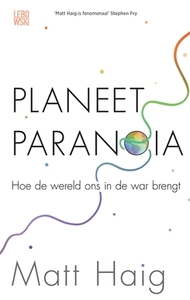You need to sign in or sign up before continuing.
Take a photo of a barcode or cover
i'm in a bad mental place rn which means that i literally enjoy nothing 100% atm. a few chapters were really good, i marked some passages that resonated with my depression and anxiety and how i feel as a part of society in general but overall i couldnt connect to this novel fully which made me even more sad because reasons to stay alive means so much to me. there are some great messages but there is also some repetition of things that are mentioned really often and tips that are not really possible for me to do/set into motion/change about my life and kinda bummed me out because of it. i can't seem to form coherent sentences that describe this book well rn so ill just stop and let it go.
fast-paced
I listened to Matt Haig read this book on Audible. I also listened to him read Reasons To Stay Alive. He’s a great narrator especially for these books that are so personal to him. I’ll go back and read both of these books someday.
emotional
inspiring
reflective
fast-paced
emotional
hopeful
informative
inspiring
lighthearted
reflective
medium-paced
hopeful
reflective
I found myself really loving some parts of the book, while other parts I enjoyed less.
I think this was mostly because the things that Matt Haig described as anxiety-inducing weren’t always the same things that trigger my anxiety, which is a statement I’ve seen echoed in other reviews. I don’t think this makes the book any less important (there’s not a ‘right’ way to be anxious, and Haig is clear that he’s writing from his own experience) but I do think it’s worth being mindful of how complex and subjective anxiety can be.
The book sometimes seemed to present anxiety as a uniquely modern experience, intrinsically tied to modern life. I’m always a bit wary of arguments like this, that seem to hark back to an imagined, easier era. I don’t really think this was Haig’s aim or belief. He did actually explore a couple of historical references that mirror our modern experiences (I really enjoyed Samuel Pepys checking his pocket watch) but I still felt that the central thesis tying anxiety to modernity was a little simplistic. There’s no singular root cause of poor mental health, just as there’s no singular fix. And while I agree there is a link between our culture and current mental health issues, which is very good to be aware of and critical of, the picture is much broader than discussed in this book.
Generally, though, the advice given was helpful and Haig’s ideas are valuable. I really enjoy Matt Haig’s writing, particularly about mental health. I love his descriptions of nature and his clear passion for life. This book was no exception.
I think this was mostly because the things that Matt Haig described as anxiety-inducing weren’t always the same things that trigger my anxiety, which is a statement I’ve seen echoed in other reviews. I don’t think this makes the book any less important (there’s not a ‘right’ way to be anxious, and Haig is clear that he’s writing from his own experience) but I do think it’s worth being mindful of how complex and subjective anxiety can be.
The book sometimes seemed to present anxiety as a uniquely modern experience, intrinsically tied to modern life. I’m always a bit wary of arguments like this, that seem to hark back to an imagined, easier era. I don’t really think this was Haig’s aim or belief. He did actually explore a couple of historical references that mirror our modern experiences (I really enjoyed Samuel Pepys checking his pocket watch) but I still felt that the central thesis tying anxiety to modernity was a little simplistic. There’s no singular root cause of poor mental health, just as there’s no singular fix. And while I agree there is a link between our culture and current mental health issues, which is very good to be aware of and critical of, the picture is much broader than discussed in this book.
Generally, though, the advice given was helpful and Haig’s ideas are valuable. I really enjoy Matt Haig’s writing, particularly about mental health. I love his descriptions of nature and his clear passion for life. This book was no exception.
reflective
This book is truly a gift. I love Haig’s novels; the way it takes something normal, mundane even, and by slightly tilting it brings about a whole new perspective. He does the same thing to mental illness in this book. Not that mental health is mundane but he brings a fresh perspective to anxiety and trying to live a mentally healthy life.
A book I should own and re-read from time to time.
Haig brings himself to this book but also countless researchers. He explains why seemingly simple things like grocery shopping can be so anxiety inducing. The reality is that grocery stores and shopping malls are built to make us anxious by first making us feel inadequate and then offering an overwhelming number of choices. In fact much of the world is intentionally created to raise anxiety so we are unhappy with our lives and buy what they are selling or as Haig says “[h]appiness is not good for the economy”. That FUD (Fear Uncertainty and Doubt) is an actual marketing principle.
A wonderful book everyone that struggles with mental illness or loves someone with mental illness should read.
Remember to look at the sky everyday.
A book I should own and re-read from time to time.
Haig brings himself to this book but also countless researchers. He explains why seemingly simple things like grocery shopping can be so anxiety inducing. The reality is that grocery stores and shopping malls are built to make us anxious by first making us feel inadequate and then offering an overwhelming number of choices. In fact much of the world is intentionally created to raise anxiety so we are unhappy with our lives and buy what they are selling or as Haig says “[h]appiness is not good for the economy”. That FUD (Fear Uncertainty and Doubt) is an actual marketing principle.
A wonderful book everyone that struggles with mental illness or loves someone with mental illness should read.
Remember to look at the sky everyday.


